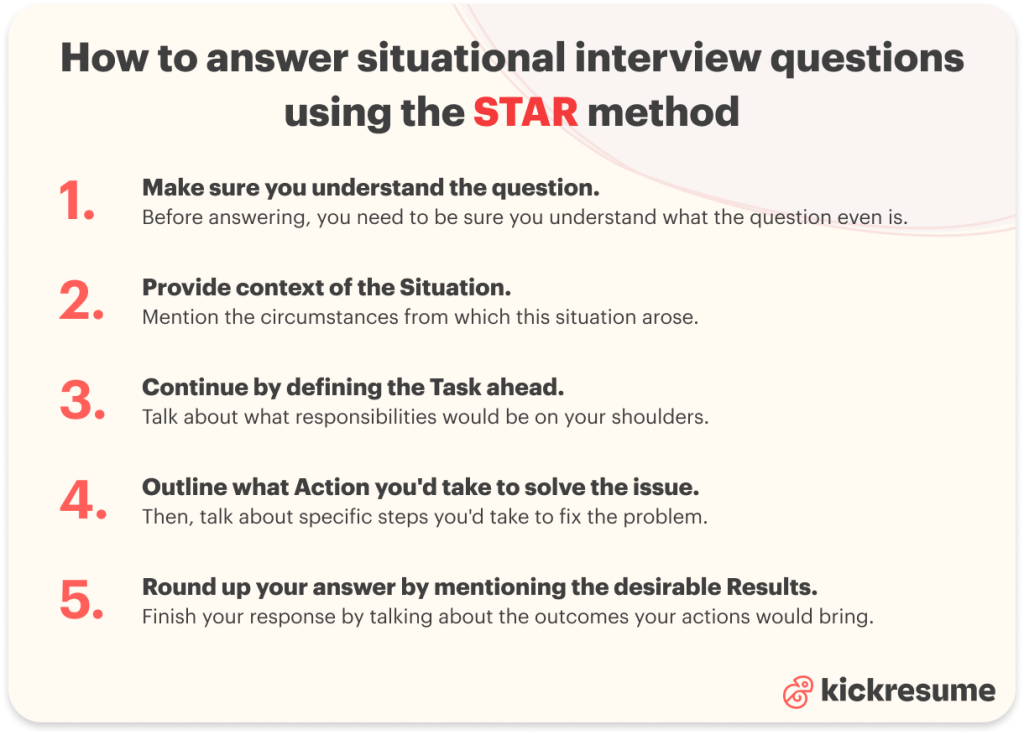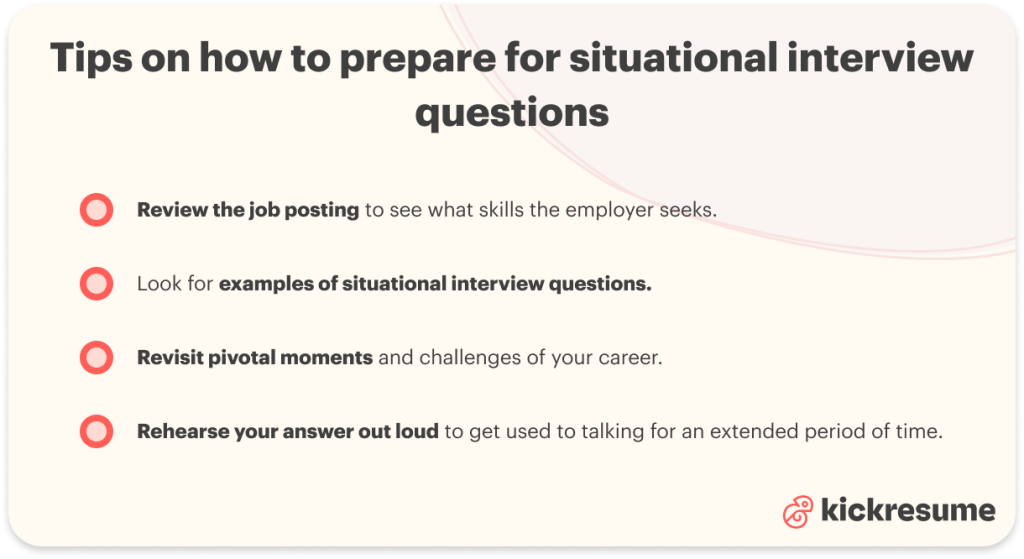Situational interview questions can be pretty tricky to answer, since you're expected to think on your feet and think fast.
These questions often throw candidates into hypothetical scenarios that require quick thinking and creative problem-solving.
Moreover, they are designed to peel back the layers of rehearsed answers, revealing how you handle challenges and unexpected situations.
Feeling the stress-levels rising already? That's understandable, but unnecessary!
While it might seem impossible to prepare for such unpredictable questions, there is a tried-and-true method that can help you deliver your answers with confidence.
Piqued your interest? If so, keep on reading and discover:
- What are situational interview questions;
- 30 situational interview questions examples;
- How to answer situational interview questions;
- And 3 detailed sample responses.
- What is a situational interview
- What are situational interview questions
- 30 Situational interview questions examples
- How to answer situational interview questions
- Tips on how to prepare for situational interview questions
- How NOT to answer situational interview questions
- Key takeaways: Situational interview questions
What is a situational interview
In short, during a situational interview, the job candidate is asked to explain how s/he would deal with specific work scenarios. This type of interview helps recruiters figure out how a candidate might perform on the job by seeing how they think through problems and deal with challenges in real time.
But what makes the situational interview such a hot commodity?
Basically, it's popular among recruiters because it goes beyond what's written on your resume.
Let us explain: Your resume is succinct and concise, which means that you need to be very selective about the information you include. While you have enough space to showcase all your proudest achievements and results, you don't really get the chance to go into much detail on how exactly you got there. And this means that the recruiters can’t see how you approach problems and what attitude you have when faced with challenges.
And asking situational interview questions allows them to see just that!
In other words, a situational interview is like a test run to see how you might perform in the real world, focusing on practical skills and real-life problem solving rather than just what you say you can do.
Situational interview vs. behavioral interview
One can’t simply talk about the situational interview without mentioning its twin – the behavioral interview.
These two job interview methods are quite similar, so much so that people sometimes use the terms interchangeably.
But while both of these interview styles force you to demonstrate your skills and know-how on specific work scenarios, there is one key difference:
- Behavioral interview: This approach focuses on your real past experiences. Behavioral questions prompt you to demonstrate your skills by presenting situations you've actually dealt with in real life. For example, a question probing your conflict resolution skills can look like this: “Tell me about a time you had an interpersonal conflict at work.”
- Situational interview: The situational approach examines how you would act in hypothetical future scenarios. For instance, our conflict resolution question could go something like this: “How would you deal with an interpersonal conflict at work?”
On a superficial level the difference between the two might seem too little to matter. But if you're a career changer or a fresh graduate, you'd quickly see why the situational interview questions are a much better alternative.
Well, you can hardly talk about the experiences you don't have, right? But what you can do is discuss future hypothetical scenarios based on your intuition, skills, and logic.
What are situational interview questions
Well, when we talk about job interviews, there are certain questions everybody expects to hear, such as “Why are you interested in this position?”, “Where do you see yourself in 5 years?” or “Why are you looking for a new job?”
And while your answers to these questions reveal your enthusiasm for the role, your career goals, and your motivation respectively, they don't provide much insight into what's going on in your head when faced with problems in the workplace.
That's why the formulation of situational questions typically revolves around “what if” scenarios that could actually happen to you in your new role.
For example, the interviewer might ask, “What steps would you take if you were given a project with a very tight deadline?" or “How would you communicate negative feedback to your team?”
Apart from specific industry knowledge, suítuational questions can shine light on your soft skills:
- Ability to think on your feet. Do you have the right approach for handling the pressures and responsibilities of the job?
- Your problem solving skills. How good are you at analyzing, prioritizing, and decision-making?
- Your creativity and adaptability. And, how quickly can you come up with a potential solution to an unusual problem?
30 Situational interview questions examples
Below, you'll find 30 examples of situational interview questions (You can't accuse us of being stingy!) that might come your way during the job interview rounds.
Additionally, you'll find the specific skill each question probes in the brackets.
Please, keep in mind that the precise wording of these questions may differ from company to company.
- What would you do if a client made a complaint about your work? (Feedback Reception Question)
- How would you react if halfway through a major project, the core objectives were changed by management? (Adaptability Question)
- If you were leading a team that seemed demotivated, what strategies would you use to boost morale? (Leadership Question)
- If you had to choose between meeting a project deadline with a compromised product or delaying delivery to ensure quality, what would you do? (Decision-making Question)
- How would you handle a situation where you need to communicate a last-minute change in project direction to a team that is not on-site? (Communication Skills Question)
- How would you manage a scenario where an important client demands a service or product adjustment that is not currently feasible? (Customer Service Question)
- How would you lead a project with team members who are more experienced than you in the subject matter? (Leadership Question)
- How would you prioritize your tasks if you find yourself with multiple high-priority assignments due on the same day? (Time Management Question)
- A new employee has joined your team. What do you do to make them feel welcome? (Leadership Question)
- Imagine you have conflicting deadlines for two equally important projects. How would you decide which to prioritize? (Decision-making Question)
- Imagine you're leading a critical project that is running behind schedule. How would you handle the pressure? (Stress Management Question)
- Imagine you need to explain a new, complex software tool to a team that isn't tech-savvy. How would you go about it? (Communication Skills Question)
- If you found yourself in a disagreement with a colleague about a project approach, how would you handle it? (Conflict Resolution Question)
- How would you organize your time if you're having a busy week? (Time Management Question)
- How would you approach a situation where you have to work closely with someone whose work ethic is vastly different from yours? (Communication Skills Question)
- Walk me through how you solve a prevailing issue with your manager. (Communication Skills Question)
- Imagine you must choose between investing in new technology or upgrading existing systems with a limited budget. How would you make your decision? (Decision-making Question)
- What would you do if you discovered a critical flaw in a product that's about to launch? (Problem-solving Question)
- How would you react if you discovered that one of your colleagues acts against the company values? (Communication Question)
- How would you ensure smooth cooperation between different departments? (Teamwork Question)
- Imagine that you discovered an opportunity for improvement in a process that's not within your direct responsibility? (Initiative Question)
- What would you do if your team members constantly ignored your input? (Communication Question)
- How would you respond to a customer complaint you believe is unwarranted? (Customer Service Question)
- How would you handle a situation where you need to mediate a conflict between two key team members who are crucial for the project's success? (Conflict Resolution Question)
- Imagine you're leading a project and your team expresses doubts about the plan. How would you address their concerns? (Leadership Question)
- Suppose during a project review, you notice data that suggests a potential problem no one else has seen. How would you handle this situation? (Critical Thinking Question)
- You're presented with two competing proposals for a new project. Both have potential but also significant risks. How would you evaluate and decide which proposal to go with? (Critical Thinking Question)
- Imagine that you'd be asked to do something you've never done before. How would you handle that? (Adaptability Question)
- If you noticed a team member feeling excluded and their contributions diminishing as a result, what steps would you take to involve them more into the team dynamic? (Teamwork Question)
- Imagine you're taking over a team that has been underperforming. What initial steps would you take to assess the situation and begin turning around the team's performance? (Leadership Question)

How to answer situational interview questions
Because workplaces and job roles are so diverse, employers can craft countless unique scenarios to test your problem-solving skills, adaptability, teamwork, leadership, and other crucial competencies.
Still, there's a way to deliver your answer clearly and persuasively no matter the question – by following the STAR method (Situation, Task, Action, Result).
Let us walk you through the S-T-A-R method step by step:
- Provide context of the Situation.
Firstly, start by setting the scene. If the situational interview question was quite vague, you've got a chance to fill in the blanks! Mention where this hypothetical situation is happening and the circumstances from which this situation arose.
- Continue by defining the Task ahead.
Secondly, you should explain what exactly is the problem you're dealing with. Talk about what responsibilities would be on your shoulders and what would be the general expectations from you. And, of course, make sure to mention skills and duties that directly relate to the job position you're trying to fill.
- Outline what Action you'd take to solve the issue.
Thirdly, you talk about the concrete actions you'd take to fix the problem. Remember that this part is the heart of your answer! And the recruiters want to see the thought processes that lead to your actions.
- Round up your answer by mentioning the desirable Results.
And lastly, finish your response by talking about the outcomes your actions would bring. Think about how the company would benefit from your solution. Focus on showcasing how your actions lead to success in this hypothetical scenario.
With that being said, we’ll have a look at how you can put the theory into practice!
Example #1: Leadership question
Situational interview question: Imagine you're taking over a team that has been underperforming. What initial steps would you take to assess the situation and begin turning around the team's performance?
Sample answer:
Example #2: Feedback Reception Question
Situational interview question: What would you do if a client made a complaint about your work?
Sample answer:
Example #3: Decision-making question
Situational interview question: Imagine you have conflicting deadlines for two equally important projects. How would you decide which to prioritize?
Sample answer:
Tips on how to prepare for situational interview questions
You can't know exactly which situational interview questions you'll be asked.
Which is why you should never underestimate the power of good preparation.
Once you've received your job interview invitation, you can start doing these 4 things:
- Review the job posting. Although you don't know for certain what the questions will be, you can take an educated guess. Hint: The requirements outlined in the job ad are a dead giveaway of what the employer cares about.
- Look for examples of situational interview questions. Basically, you're doing it right now. Do as much research as possible! Because going into job interviews blindly is simply nonsensical.
- Revisit pivotal moments and challenges of your career. While it's true that situational questions usually involve hypothetical scenarios, that doesn't mean you can't talk about the things you've already achieved! For example, you can preface your response by mentioning that your answer is informed by real-life experience.
- Rehearse your answer out loud. No, no, don't raise your eyebrows just yet! Going over your answers in your mind in one thing. But spending an extensive period of time talking out loud can be more exhausting than you'd think. Especially in a nerve-inducing setting like a job interview. And practice is key!
Don't get intimidated by the unknown! Instead, get familiar with it by diligent research and practice.

How NOT to answer situational interview questions
A well-rounded job interview preparation isn't just about knowing what to say, but also about knowing what NOT to say. We advise you to avoid the following:
- Don't say “I don't know.” You might as well just throw in the towel! These questions are meant to test your adaptability and attitude towards challenges. Keep that in mind.
- Don't be vague. Instead, go into detail on the steps you take in each scenario. The more specific, the better!
- Don't be hasty with your answer. It's OK to give yourself some time to think. It's better to take a few seconds to check in with yourself instead of blurting out something that doesn't make sense. But that doesn't mean that you should sit there in silence for 5 torturous minutes.
- Don't panic. Yes, we know that it's difficult to stay cool, calm, and collected in a situation where you don't hold the wheel. But just take a deep breath and focus! Plus, practicing can make you feel more prepared and in control.
Key takeaways: Situational interview questions
To sum it all up, situational interview questions are meant to probe how you would deal with workplace problems in real life.
Situational interviews focus on hypothetical scenarios to assess how a candidate might perform on the job, giving insight into their problem-solving and decision-making skills.
Though these questions can be difficult to predict, following the STAR method allows you to give your answers the structure and clarity they need to impress the hiring manager.
Here is a simple how-to:
- Firstly, make sure you understand the question.
- Provide context of the Situation.
- Continue by defining the Task ahead.
- Outline what Action you'd take to solve the issue.
- Finally, round up your answer by mentioning the desirable Results.



